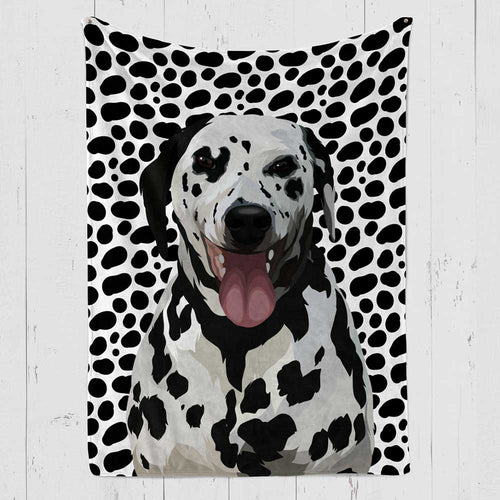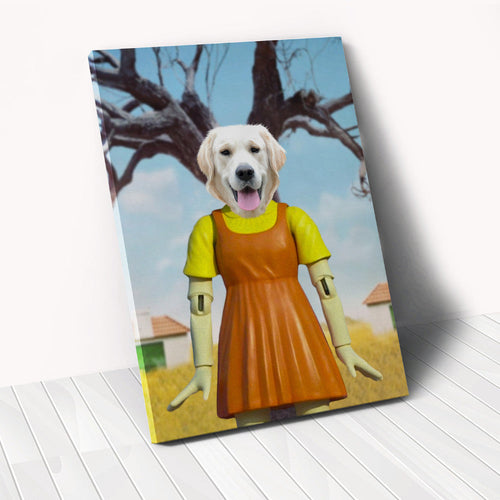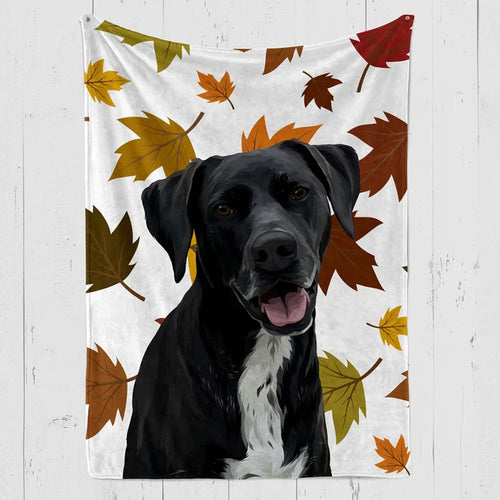
Dogs have been around us for thousands of years and the bond has strengthened over time because dogs always find ways to share their emotions, feelings, and needs in different ways. Although these behaviors might be strange, annoying, or even destructive at times, they always have some underlying meaning. One such annoying behavior is the practice of scratching the door. In this blog, we are going to try and find out what might be causing your dog to scratch the door and how to prevent them from doing so.
If your dog is constantly pawing or scratching at your door it will not only damage your door but might also cause injury to your beloved pet like splinter injury, damage to the claws, stomach issues from the ingested wood, and so on. Hence it becomes imperative for us to address the behavior to dissuade them from such destructive behavior.
Why is Your Dog Scratching the Doors?
If you are annoyed by this destructive habit or wondering how to stop your dog from scratching the door, you must pay close attention to your dog to find the root cause which might be triggering this behavior. Once you find it, half the battle is won. Then you just need to enforce corrective behavior or remove the trigger to create a happy and loving environment for both you and your pet. Here are some of the potential causes which you might look out for:
1. Needs:
Is your dog scratching the door when you are inside the house, chances are that he wants to go out for different reasons like wanting to relieve himself or it wants to investigate something that is going on the other side, or maybe he just wants to go out for a play in the yard and so on.
2. Separation Anxiety:
If your dog starts scratching the door when you leave him inside on his own, or you find scratch marks on the doors or windows when you return, then it might be a sign of separation anxiety.
3. Habit:
Chances are there that your dog has developed a habit of communicating with you through the process of scratching the door, say, you open the door to the bathroom when he scratches at it. Or you might be giving him what he wants to stop him from scratching, these things enforce negative behaviors.
4. Discomforts arising from health issues:
Dogs might develop many habits or do things that they otherwise don’t do if they are facing some kind of discomfort. They might be confused and struggling to convey their feelings or just trying to alleviate their discomfort. This is especially true for older dogs who are more likely to have some health issue that is bothering them.
5. Excess energy or boredom:
Dogs love their playtime as much as they love socializing and hanging around you. Depending on the breed and age of your dog, they might need varying degrees of physical and mental stimulation. If they are not provided with this, they will feel frustrated over time and indulge in repetitive negative behaviors, and door scratching is one of them.
6. Attention-seeking behavior:
Your dog might have picked up the cue that you pay attention to its needs or wants when they engage in some destructive behavior like door scratching. Or you pick him up and cuddle him to dissuade him from scratching at the door, so with time, it has learned that it gets them your attention and love. So like a child, they develop this attention-seeking behavior.
How to Stop Your Dog from Scratching a Door?
If your dog has developed the habit of constantly scratching the door and you want to get rid of such negative habits, then here are a few tips and tricks that you might consider:

1. Seek Professional Help:
If your dog suddenly picked up the habit of scratching the door or it is becoming excessive or you think that it might be due to some discomfort arising due to health issues, then it is always advisable to go to a veterinarian or a behavior specialist who can deal with the issue professionally and provide a tailor-made solution.
2. Positive Reinforcement Training:
Most dogs respond to positive reinforcement training and if this works, then there’s nothing like it as such training sessions can be really enjoyable for the trainer and stimulating for the dog. Here are some of the things you might consider:
- Reward your dog: If your dog stays calm for 30 seconds then pet him, or give him a treat, this will encourage him to stay calm and slowly develop it as a habit.
- Use basic commands like a firm “No”, “Leave it” or “Stay”: Use any such basic commands and stick to them whenever you catch him in the act. And say it like a pack leader. And if they stop for thirty seconds or so, go back to the rewarding technique.
3. Address Separation Anxiety:
If your dog seems to be suffering from separation anxiety, don’t be harsh at him, scratching the door is just a way for him to deal with the anxiety. Rather look for solutions like:
- Providing something as your replacement: Leave some clothes with your smell for him to play with for the isolation periods.
- Teach him to be alone: It can be a hard thing but with patience and regular practice along with positive enforcement your dog will get used to spending time alone.
- Correcting your subconscious attitude: Your dog’s anxiety might be stemming from your anxious subconsciousness, they are very sensitive creatures and if they feel that their owner is anxious or worried they might become anxious. In that case, consider consulting a behaviorist who can guide you on how to deal with them.
- Play some music or radio: Total calmness in the air might cause anxiety among dogs, playing some music in the room makes them feel less lonely.
4. Create a Dog-friendly Environment:
Our pets depend on us for their environmental situation, so it should be our priority to provide them with a suitable and comfortable environment otherwise they will develop repetitive habits to deal with the discomfort. Some of these environmental improvements might be:
- Providing a dog door: So that he can pass through to address his needs
- Training him to use a bell: to let you know he wants to go out in the yard or for a walk
- Teaching him gestures: like sitting at the toilet door instead of scratching the door to indicate his need.
- Bedding: Provide comfortable and dedicated bedding for your dog and if possible a kennel that might become his safe and happy retreat place.
- Proper room temperature: Make sure the room is neither too hot nor too cold
- Introduce scratching alternatives: Provide him with some scratching posts or rugs and reward him for using them.
- Use of deterrents: If your dog is constantly scratching a particular door, use pet-friendly spray or tapes to discourage the habit.
5. Provide Ample Exercise and Mental Stimulation:
Dogs need regular physical exercise and mental stimulation depending on the breed and age. If they spend too much time indoors or confined to a spot doing nothing, they will get bored and have a lot of pent-up energy. Eventually, they will engage in destructive behaviors like chewing the door. So creating a routine for walks or playtime or maybe some game of scent searching or obedience training helps wear them down and provide the required stimulus for their general well-being.
6. Manage Excitement Levels:
It might be hard for us but we need to practice and control the state of excitement in our dogs. Some of it might be:
- Staying calm before leaving as well as when we return home. They might get excited or anxious but we don’t need to respond to them with the same elevated excitement.
- Don’t take him out for a walk or give him whatever he wants when he starts scratching at the door. Wait for some time till he calms down and then only address his needs. Over time he will understand that patience gives him the results and enforce the same with rewards.
- Providing some distractions like feeding puzzles or some other toys combined with lessons on staying alone can help manage his excitement levels.
7. Use a pheromone diffuser or a collar:
Consider using a pheromone diffuser or a collar when you leave your dog alone at home. It helps them calm down. But it is most helpful when you use it in combination with positive reinforcement during the modification of unwanted behavior.
Takeaway
So we can see that addressing your dog’s scratching habit is a matter of patience, understanding, and consistency. Each dog is unique and depending on the breed they will require varying degrees of training. So it is important to customize the approach on a case to case basis. We should invest some time and attention to identifying the underlying issue that is triggering the destructive behavior and with proper approaches like excitement management training, creating a dog-friendly environment, anxiety separation addressal and so on we can create a happy environment for both us and our dogs. If this scratching behavior persists, feel free to consult an expert and above all, stay positive throughout the training process.
Frequently Asked Questions:
Can I use punishment to stop my dog from scratching the door?
Using punishment might not be the best way for dealing with such behaviors as they might not understand the reason for being punished, rather it might add to the anxiety. We should focus more on positive reinforcement.
Why is my dog scratching the door at night?
If your dog is choosing the nighttime for scratching the door, the most likely reason is its anxiousness. Perhaps, it wants to sleep with you, and closing the door while sleeping prevents it from doing that. It might want to be close to you at night or his willingness to provide full protection while you are sleeping.
How can I protect the door from scratches?
There are a number of ways to deal with this issue, some of the common methods might be using scratch screens, some deterrent sprays, installing a dog door, or blocking the access to the door. But the best practice would be training your dog to not scratch the door in the first place.
Reference Links:
Recommended Videos :
Recommended Articles :
- Why Do Dogs Dig In Bed?
- Why Does My Dog Nibble On Me
- Why Do Dogs Lick Blankets?
- How To Get Dog Hair Out Of Blankets?
Latest Review on Woof Blankets
To have such a masterpiece by my side every day is a gift for me and my memories with Rex. Thank you WoofBlankets for such an opportunity to recreate his image on a blanket.Lara o’ Miguel US, California

COLLECTION WORTH EVERY PENNY
BEST SELLERS
-
Woofy Single Color Custom Pet Blanket
![Woofy Single Custom Pet Blanket – Woof Blanket]()
- -41%
BlanketsSHOP NOW- Regular price
- from $64.95
- Sale price
- from $64.95
- Regular price
-
$109.95 - Unit price
- per
Sold out -
Exclusive Christmas Custom Pet Blanket
![Exclusive Custom Pet Blanket]()
- -39%
BlanketsSHOP NOW- Regular price
- from $69.95
- Sale price
- from $69.95
- Regular price
-
$114.95 - Unit price
- per
Sold out -
Christmas Custom Pet Blanket
![Christmas Custom Pet Blanket - Custom Dog Blankets]()
- -40%
BlanketsSHOP NOW- Regular price
- from $69.95
- Sale price
- from $69.95
- Regular price
-
$115.95 - Unit price
- per
Sold out -
Watercolor Pet Portraits
![]() SHOP NOW
SHOP NOW- Regular price
- from $59.95
- Sale price
- from $59.95
- Regular price
-
- Unit price
- per
Sold out -
Woofy Christmas Custom Dog Blanket
![Woofy Christmas Custom Dog Blanket]()
- -39%
BlanketsSHOP NOW- Regular price
- from $69.95
- Sale price
- from $69.95
- Regular price
-
$114.95 - Unit price
- per
Sold out -
Modern Pet Owner Portrait
![]()
- -32%
CanvasSHOP NOW- Regular price
- from $84.95
- Sale price
- from $84.95
- Regular price
-
$124.95 - Unit price
- per
Sold out -
Woof Splash Custom Pet Blanket
![Woof Splash Custom Pet Blanket]()
- -39%
BlanketsSHOP NOW- Regular price
- from $69.95
- Sale price
- from $69.95
- Regular price
-
$114.95 - Unit price
- per
Sold out -
The Admiral - Custom Pet Portrait
![The Admiral - Custom Pet Portrait Online]()
- NEW
- -25%
CanvasSHOP NOW- Regular price
- from $59.95
- Sale price
- from $59.95
- Regular price
-
$79.95 - Unit price
- per
Sold out -
Wings of Loyalty - Custom Pet Portrait
![]()
- NEW
CanvasSHOP NOW- Regular price
- from $59.95
- Sale price
- from $59.95
- Regular price
-
- Unit price
- per
Sold out -
Pet Memorial Custom Photo Collage Blanket
![Personalized pet memorial quilt with photos]()
- -41%
BlanketsSHOP NOW- Regular price
- from $64.95
- Sale price
- from $64.95
- Regular price
-
$109.95 - Unit price
- per
Sold out -
Celestial Paws - Custom Pet Portrait
![]() CanvasSHOP NOW
CanvasSHOP NOW- Regular price
- from $59.95
- Sale price
- from $59.95
- Regular price
-
- Unit price
- per
Sold out -
The Loyal Soul - Custom Pet Portrait
![]()
- NEW
SHOP NOW- Regular price
- from $59.95
- Sale price
- from $59.95
- Regular price
-
- Unit price
- per
Sold out -
Cartoonized Pet Portraits (New)
![Cartoonized Pet Custom Portraits Online]()
- -36%
SHOP NOW- Regular price
- from $59.95
- Sale price
- from $59.95
- Regular price
-
$93.95 - Unit price
- per
Sold out -
The French Sailor - Custom Pet Portrait
![]()
- -25%
CanvasSHOP NOW- Regular price
- from $59.95
- Sale price
- from $59.95
- Regular price
-
$79.95 - Unit price
- per
Sold out -
The Policeman - Custom Pet Portrait
![]()
- NEW
- -25%
CanvasSHOP NOW- Regular price
- from $59.95
- Sale price
- from $59.95
- Regular price
-
$79.95 - Unit price
- per
Sold out -
The General - Custom Pet Portrait
![]()
- NEW
- -25%
CanvasSHOP NOW- Regular price
- from $59.95
- Sale price
- from $59.95
- Regular price
-
$79.95 - Unit price
- per
Sold out -
Woof Love Custom Pet Blanket
![Woof Love Custom Pet Blanket]()
- -39%
BlanketsSHOP NOW- Regular price
- from $69.95
- Sale price
- from $69.95
- Regular price
-
$114.95 - Unit price
- per
Sold out -
Summer Time Custom Pet Blanket
![Summer Time Custom Pet Blanket]()
- -39%
BlanketsSHOP NOW- Regular price
- from $69.95
- Sale price
- from $69.95
- Regular price
-
$114.95 - Unit price
- per
Sold out -
The Ambassador - Custom Pet Portrait
![The Ambassador - Custom Pet Portrait Online]()
- NEW
- -25%
CanvasSHOP NOW- Regular price
- from $59.95
- Sale price
- from $59.95
- Regular price
-
$79.95 - Unit price
- per
Sold out -
Fall In Love Custom Pet Blanket
![Fall In Love Custom Dog Blanket]()
- NEW
- -39%
BlanketsSHOP NOW- Regular price
- from $69.95
- Sale price
- from $69.95
- Regular price
-
$114.95 - Unit price
- per
Sold out -
The Classy Lady - Custom Pet Portrait
![The Classy Lady]()
- NEW
- -25%
CanvasSHOP NOW- Regular price
- from $59.95
- Sale price
- from $59.95
- Regular price
-
$79.95 - Unit price
- per
Sold out -
The Duke - Custom Pet Portrait
![The Duke - Custom Pet Portrait]()
- NEW
- -25%
CanvasSHOP NOW- Regular price
- from $59.95
- Sale price
- from $59.95
- Regular price
-
$79.95 - Unit price
- per
Sold out -
Dog In Suit- Custom Pet Portrait
![Dash Dog In Suit- Custom Pet Portrait Online]()
- NEW
- -25%
CanvasSHOP NOW- Regular price
- from $59.95
- Sale price
- from $59.95
- Regular price
-
$79.95 - Unit price
- per
Sold out -
The Princess - Custom Pet Portrait
![]()
- NEW
- -25%
CanvasSHOP NOW- Regular price
- from $59.95
- Sale price
- from $59.95
- Regular price
-
$79.95 - Unit price
- per
Sold out -
Modern Pet Portrait with One Mug
![Modern Pet Portrait with One Mug]()
- -25%
Print MaterialSHOP NOW- Regular price
- from $99.95
- Sale price
- from $99.95
- Regular price
-
$133.95 - Unit price
- per
Sold out -
The Aristocrat - Custom Pet Portrait
![The Aristocrat - Custom Pet Portrait At Best Price]()
- NEW
- -25%
CanvasSHOP NOW- Regular price
- from $59.95
- Sale price
- from $59.95
- Regular price
-
$79.95 - Unit price
- per
Sold out -
Single Color Custom Blanket with 1 Mug
![Single Color Custom Blanket with 1 Mug]() BlanketsSHOP NOW
BlanketsSHOP NOW- Regular price
- from $99.95
- Sale price
- from $99.95
- Regular price
-
- Unit price
- per
Sold out -
Single Color Custom Blanket with 2 Pillows
![Single Color Custom Pet Blanket with 2 Pillows]()
- -21%
BlanketsSHOP NOW- Regular price
- from $99.95
- Sale price
- from $99.95
- Regular price
-
$125.95 - Unit price
- per
Sold out -
The Dog in Suit Custom Pet Mug
![]()
- -20%
MugsSHOP NOW- Regular price
- $39.95
- Sale price
- $39.95
- Regular price
-
$49.95 - Unit price
- per
Sold out -
Angel Custom Pet Mug
![]()
- -20%
MugsSHOP NOW- Regular price
- $39.95
- Sale price
- $39.95
- Regular price
-
$49.95 - Unit price
- per
Sold out -
This Human Belongs To - Custom Pet Mug
![]()
- NEW
- -20%
MugsSHOP NOW- Regular price
- $39.95
- Sale price
- $39.95
- Regular price
-
$49.95 - Unit price
- per
Sold out -
It's Not Dog Hair Custom Pet Mug
![]()
- NEW
- -20%
MugsSHOP NOW- Regular price
- $39.95
- Sale price
- $39.95
- Regular price
-
$49.95 - Unit price
- per
Sold out -
My Dog Is My Valentine Custom Pet Mug
![]()
- NEW
- -20%
MugsSHOP NOW- Regular price
- $39.95
- Sale price
- $39.95
- Regular price
-
$49.95 - Unit price
- per
Sold out -
3 Photos With Message Custom Pet Mug
![]()
- NEW
- -20%
MugsSHOP NOW- Regular price
- $39.95
- Sale price
- $39.95
- Regular price
-
$49.95 - Unit price
- per
Sold out -
My Valentine Has Four Legs- Personalized Mugs
![]()
- NEW
- -20%
MugsSHOP NOW- Regular price
- $39.95
- Sale price
- $39.95
- Regular price
-
$49.95 - Unit price
- per
Sold out -
Dog Mamma Custom Pet Coffee Mug
![]()
- -20%
MugsSHOP NOW- Regular price
- $39.95
- Sale price
- $39.95
- Regular price
-
$49.95 - Unit price
- per
Sold out -
Uncle Sam - Custom Pet Portrait
![]()
- NEW
- -25%
CanvasSHOP NOW- Regular price
- from $59.95
- Sale price
- from $59.95
- Regular price
-
$79.95 - Unit price
- per
Sold out -
The Revolutionary Emperor - Custom Pet Portrait
![]()
- NEW
- -25%
CanvasSHOP NOW- Regular price
- from $59.95
- Sale price
- from $59.95
- Regular price
-
$79.95 - Unit price
- per
Sold out -
The Princess Paws - Custom Pet Portrait
![]()
- -25%
CanvasSHOP NOW- Regular price
- from $59.95
- Sale price
- from $59.95
- Regular price
-
$79.95 - Unit price
- per
Sold out -
The Dark Crusader Knight - Custom Pet Portrait
![]()
- -25%
CanvasSHOP NOW- Regular price
- from $59.95
- Sale price
- from $59.95
- Regular price
-
$79.95 - Unit price
- per
Sold out































































